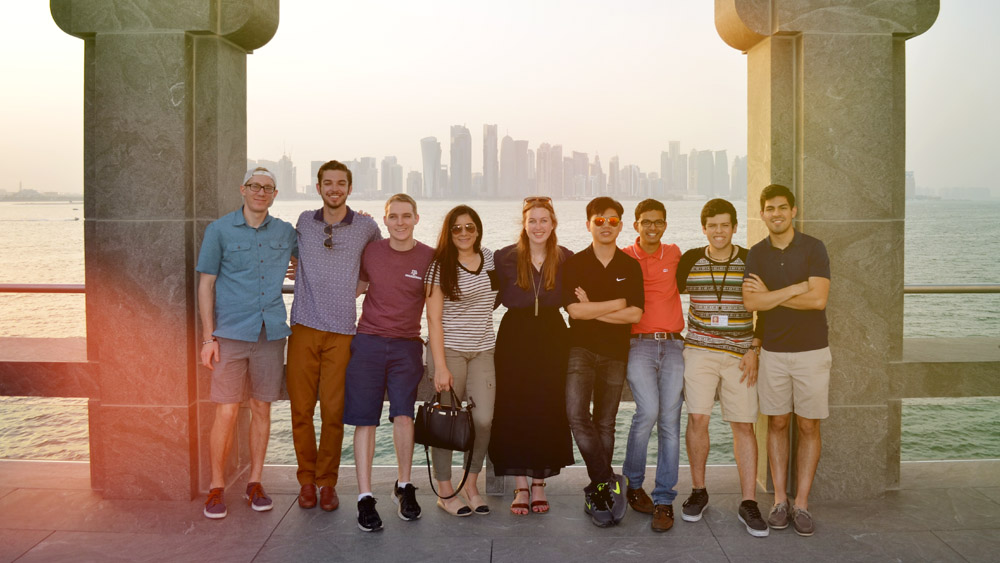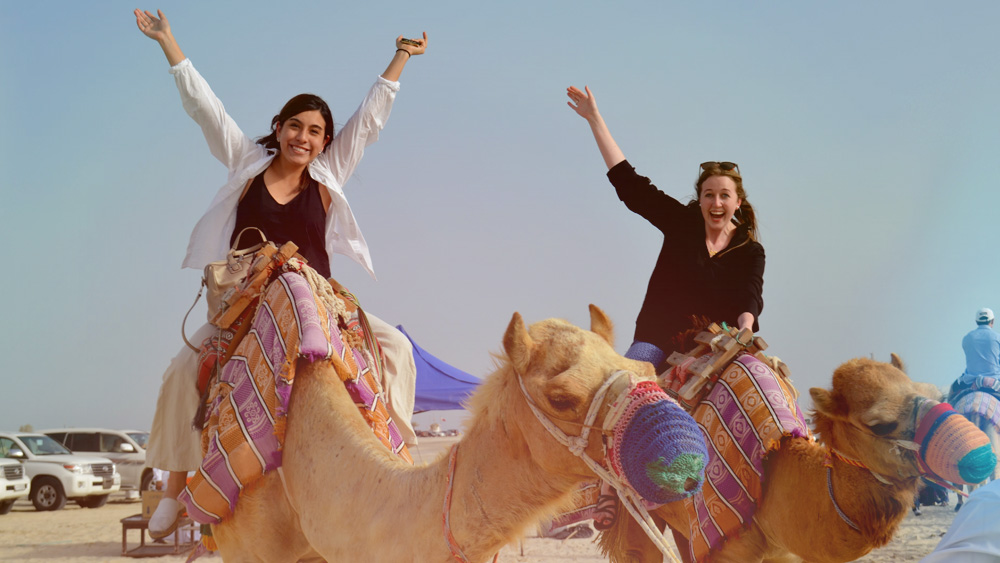
I applied on a whim during my second semester of freshman year. I knew I wanted to study abroad, but as a freshman, I couldn’t find a program that fit the classes I needed to take. I was initially unsure about Qatar and the surrounding region but was really excited at the possibility to live abroad, anywhere, for a few months. I remember talking to my parents on the phone about the program to ask for their support. They told me that I could go if I could give sufficient answers to two questions: “How do they treat women?” and “How are you going to pay for it?”
I reached out to advisors and professors who had worked at Texas A&M University at Qatar (TAMUQ) and each person had incredible stories and gave reassurance that as a woman I would be treated with respect. Additionally, I was able to receive financial support, which helped convince my parents.
What was your favorite aspect of being a student there?
Often when you go to a foreign country, it’s difficult to make connections with locals and immerse yourself in the culture. However, when you’re a student it’s much easier to make friends in your classes and meet people who want to show you what their life is like. I was in Qatar for the holy month of Ramadan and would have never had the opportunity to be a part of all the traditions had I not met my Qatari friend through a class project.

Talk about your experiences there as a woman.
As a woman, I was initially hesitant to study abroad in the Middle East because I assumed I would be forced into an abaya (black cloak) or a hijab. While Qatar has had recent pushes to retain its conservative culture, I had the freedom to wear what I pleased as long as I remained modest. This meant always having my shoulders and knees covered unless I was in the privacy of the female resident hall.
I’m used to wearing Nike shorts and a T-shirt, especially when it’s above 100°F, so this was a bit of an adjustment for me. After a while, I got used to dressing that way so that I could blend in. In Qatar, most facilities are segregated by gender. There are female and male residence halls with strict rules, and separate gyms at the rec center. At the female-only gym, the Qatari women would walk in from outside fully covered in traditional clothes, only to unveil western workout clothes under their abayas and beautiful long hair underneath their respective head coverings. Seeing that transformation was always something that stuck with me.
Respect is the word that first comes to mind when I think of the treatment of women in Qatar. I never witnessed catcalling or inappropriate staring like I have in the United States. Men would open doors and were always very friendly, while still being carefully reserved so as to not cross any of their cultural boundaries. When waiting to board public transportation, the women had a separate line and would be allowed on first before all of the men.
Did you feel safe?
I felt very safe and became just as comfortable as I am in the United States. There are very low crime rates in Qatar and everyone I met was very welcoming. In fact, in 2015, Qatar was ranked as the second safest country in the world. It especially helped to have the support of the TAMUQ faculty and the study abroad advisor in Qatar.

Would you encourage other students to study in Qatar?
I would encourage anyone who is looking for a unique study abroad experience to choose Qatar! It was amazing to be a part of the Aggie family in Qatar and learn about their own traditions.
How do you think this program helped you grow as an individual?
This program helped me develop into the person that I am today by getting me out of my comfort zone and giving me once-in-a-lifetime experiences. I was able to have honest conversations about religion, values and customs with students who came from all different backgrounds. These interactions really made me think about my own identity and how it has been shaped by the environment that I was raised in. Living abroad made me feel uncomfortable at times, but it made me more independent and self-aware.
What kind of engineering activities did you participate in?
Although TAMUQ does not offer aerospace engineering as a degree, I was able to take non-major specific classes like technical writing and anthropology. Despite not taking aerospace courses, I really enjoyed my classes because they involved a lot of group work and allowed me to get to know my classmates. Outside of coursework, there are a lot of engineering activities at TAMUQ that students can get involved in, such as research, seminars and special events. There were also several engineering outreach programs that were going on.
Do you feel this program helped you prepare for your future career?
The program helped me prepare for my future career by exposing me to different ideas and perspectives. It taught me how to work in a group of diverse people and how to communicate cross-culturally. Studying abroad in Qatar definitely helped to set me apart from other applicants when applying to internships and other opportunities.